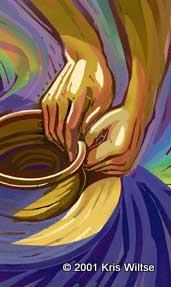Danny, my grandma, died in August–a few days after her 94th birthday. My grandfather died decades ago, but it wasn’t until Danny died that my uncles began sorting through the belongings they’d amassed over the years. That was when Dick discovered that Grandpa, an Army chaplain, had accompanied some of the defendants who were sentenced to death for war crimes at the Nüremberg trials to the gallows.

Wait. What? The guy who looked like a train engineer because he always wore blue-and-white striped overalls and a matching cap? The guy who always had a toothpick in his mouth, looked a lot like his boxer, and could be counted on to have Coffee Nips on hand? That guy?
In addition to evidence of the role that Grandpa played at the Nüremberg trials, Dick found a hand-drawn map of the concentration camp in Dachau with Grandpa’s writing on it. We know Grandpa was at Dachau after it was liberated, but we’re not sure when.
Honestly, I don’t remember my grandfather as a kind man. Though he was a “man of God,” religion seemed to be largely an intellectual exercise for him—not something he put into practice in his daily life. He originally wanted to become a doctor, but World War II put an end to that, so he became a chaplain instead. I did not know him to be a spiritual man. He often insulted and demeaned Danny and my father, which made him hard to trust and still harder to like.

What’s interesting to me is that, in spite of his Nüremberg and Dachau experiences—which might’ve led most Americans to draw unfavorable conclusions about the German people—it was Grandpa who met my mother, a German citizen, and insisted on introducing her to his son.
My German grandparents were Methodist descendants of Huguenots who were convinced Hitler was the Antichrist. At the end of the war, when Hitler was running out of men of draftable age, my Opa (grandfather) was drafted in his 40s and served as a cook in the Navy. My uncle was drafted into the SS at 17, but Oma (my grandmother) worked diligently to change that and succeeded. He became a Gebirgsjäger (mountain infantryman) instead, and both my Opa and uncle survived the war without seeing combat. Onkel Walter became a Methodist minister and met Grandpa, a Methodist Army chaplain, which led to the introduction of Mom and Dad. Which led to me.

I owe my existence to Grandpa. Somehow, what I learned about his involvement at Nüremberg and Dachau helped me see him in a different light. He didn’t judge Germans by the worst he’d seen of them. He saw what author and historian Robert Abzug says was “the trappedness of good people in the machinations of history at its most evil.” He saw the good in my mom, wanted that for his son, and it didn’t take long for Dad to realize he was right. I have rarely seen a man love a woman the way my dad loved my mom.
When I look at the following picture of Mom and Dad, whose people had been enemies little more than a decade before they met, I think of the song, “Let there be peace on Earth, and let it begin with me.” I never viewed Grandpa as spiritual. But he held a practical vision of peace that enabled him to welcome a German woman into his American family. Peace began with him. And it led to me.




